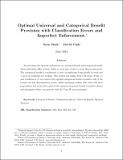Optimal universal and categorical benefit provision with classification errors and imperfect enforcement
Abstract
We determine the optimal combination of a universal benefit and categorical benefit when individuals differ in their ability to work and, if able to work, their productivity. The categorical benefit is conditioned ex ante on applicants being unable to work and ex post on recipients not working. The awards test makes Type I/II errors. If the ex post condition is (i) not enforced the optimal categorical benefit is positive only if the awards test has discriminatory power, whilst maximum welfare falls with both error propensities; but if (ii) fully enforced the optimal categorical benefit is positive always and maximum welfare can increase with the Type II error propensity.
Citation
Slack , S & Ulph , D 2017 , ' Optimal universal and categorical benefit provision with classification errors and imperfect enforcement ' , Journal of Public Economic Theory , vol. 19 , no. 2 , pp. 289-311 . https://doi.org/10.1111/jpet.12218
Publication
Journal of Public Economic Theory
Status
Peer reviewed
ISSN
1097-3923Type
Journal article
Description
Financial support from the AXA Research Fund is gratefully acknowledged.Collections
Items in the St Andrews Research Repository are protected by copyright, with all rights reserved, unless otherwise indicated.

